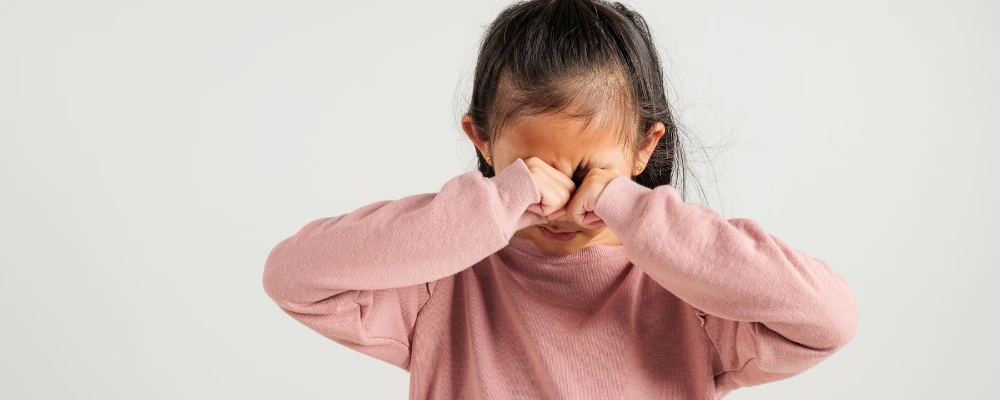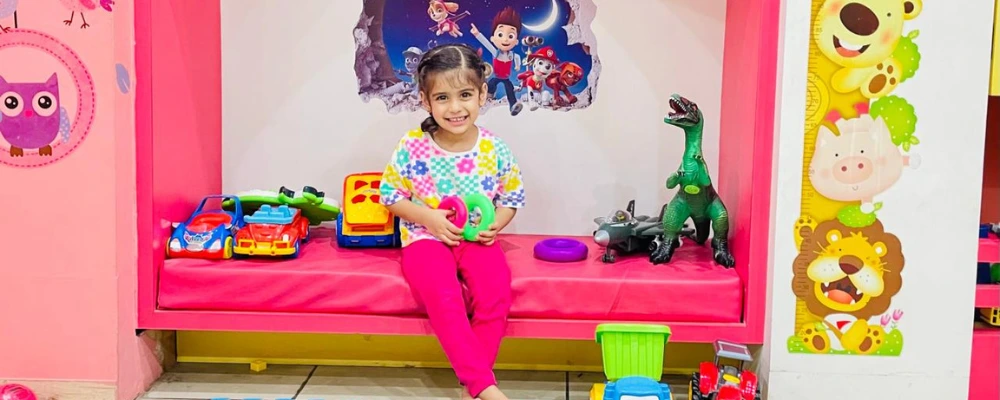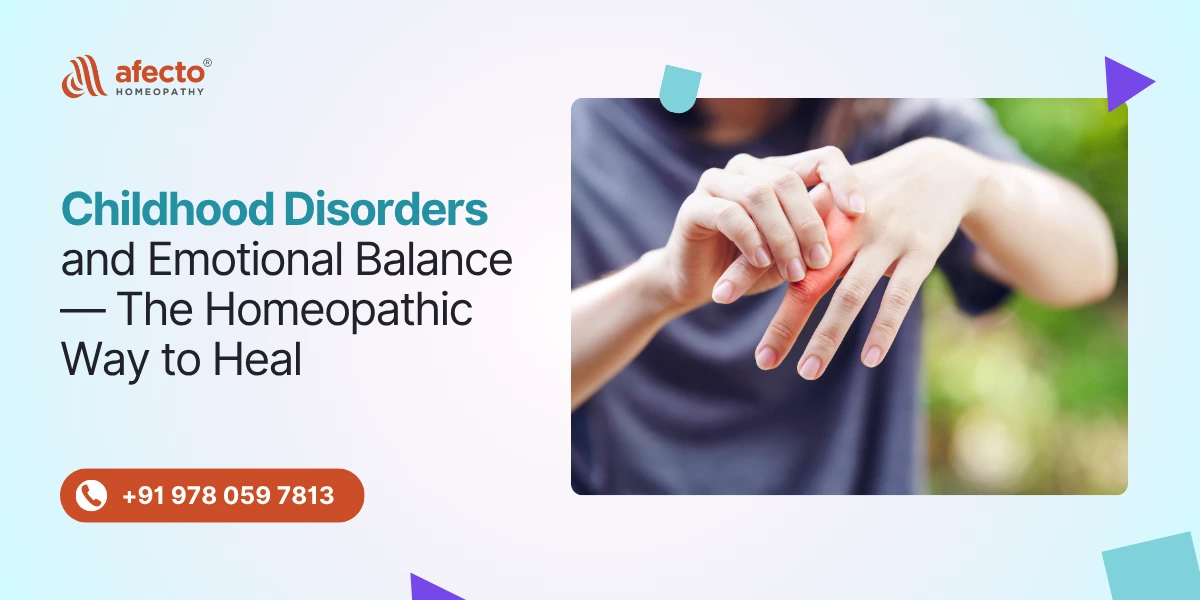Understanding Emotional Disorders in Childhood
Childhood is a crucial stage where emotional and physical development occur simultaneously. Many children face behavioral or emotional challenges—ranging from restlessness and anxiety to difficulty focusing or managing mood swings.
According to the National Center for Biotechnology Information (NCBI), 10–20% of children globally experience mental or emotional disturbances that can interfere with social and academic functioning. This high prevalence highlights the need for comprehensive and supportive care, including evidence-based medicine, behavioral therapy, and holistic approaches such as homeopathy that focus on the child as a whole.
The Mind–Body Connection in Children
Medical and psychological research increasingly supports the idea that mental and physical health are interconnected. Emotional stress in children—stemming from academic pressure, social tension, or insecurity—can manifest physically as fatigue, sleep difficulties, or digestive problems.
Homeopathy approaches this interconnection with gentleness. Rather than viewing the mind and body as separate systems, it considers both together. The goal is not to replace mainstream treatment but to complement it by supporting overall resilience, calmness, and balance.
How Homeopathy May Support Emotional Balance in Children

Homeopathy is based on individualisation—every child is seen as unique, with distinct emotional patterns and physiological traits. Treatments are chosen after a detailed assessment of symptoms, personality, and behavioral tendencies.
Homeopathic approaches may help support emotional balance by:
- Encouraging better sleep and relaxation
- Helping manage mild anxiety or restlessness
- Supporting emotional adaptability during stressful phases
- Improving general vitality and coping ability
A few small-scale studies and clinical observations in complementary medicine research have noted potential benefits of individualised homeopathy in improving emotional and behavioral parameters, though more large-scale, controlled trials are needed to establish definitive evidence.
The Four Core Imbalances That Manifest as Disorder
In pediatric homeopathy, emotional disturbances are seen not just as diagnostic labels but as reflections of deeper imbalances in a child’s adaptive system. At Afecto, doctors identify four core emotional imbalances that often precede behavioral or psychological diagnoses:
- Over-Responsiveness: When a child reacts too strongly to everyday stressors — sound, light, criticism, or change — leading to irritability, tantrums, or anxiety.
- Emotional Stagnation: A state where feelings are internalized rather than expressed, manifesting as withdrawal, fatigue, or a loss of motivation.
- Instability of Mood Regulation: Rapid, unpredictable shifts in emotion — joy to anger, calm to distress — often signaling disrupted internal equilibrium.
- Disconnection from Environment: When children seem detached, excessively day-dreamy, or indifferent to social or emotional cues.
By recognizing these patterns early, Afecto clinicians aim to restore emotional adaptability before symptoms crystallize into chronic disorders. This proactive, individualized approach forms the foundation of Afecto’s child-centric care model.
Commonly Used Homeopathic Remedies: The Afecto Perspective
At Afecto Clinics, remedies are not selected merely on textbook definitions but through an in-depth understanding of a child’s emotional landscape, medical history, and behavioral patterns. Our specialists integrate traditional homeopathic materia medica with years of pediatric clinical observation to ensure precision and safety.
- Chamomilla: Often prescribed when irritability stems from hypersensitivity to pain, discomfort, or environmental stressors. At Afecto, it’s not chosen simply for “anger” or “tantrums,” but when emotional over-reactivity is linked to physical agitation and sleep disturbances.
- Calcarea Carbonica: Considered for children who appear anxious, cautious, or easily fatigued during developmental milestones. Our doctors use it when emotional withdrawal coexists with slow physical growth or delayed adaptation to change.
- Ignatia Amara: Applied in cases where grief, disappointment, or suppressed frustration manifests as sudden mood shifts or emotional rigidity. The focus is on restoring balance after acute emotional shocks.
- Pulsatilla Nigricans: Selected for gentle, affectionate children who become clingy or tearful under emotional stress. Afecto practitioners often use it to support emotional independence in children transitioning to new environments, such as school.
- Tuberculinum: Used only under professional supervision when restlessness, impulsivity, and dissatisfaction suggest inherited sensitivity or a high-energy constitution. At Afecto, this is approached cautiously, following detailed constitutional analysis.
What the Evidence Says
While large-scale clinical data on homeopathy in childhood emotional disorders is limited, complementary and integrative health frameworks (such as those discussed by the National Center for Complementary and Integrative Health, NCCIH) recognize homeopathy as a low-risk modality that may help certain individuals through personalized, non-invasive support.
Many parents explore homeopathy for children because of its gentle nature, non-toxic remedies, and focus on individualized care. However, it should be viewed as an adjunct—not a replacement—for standard pediatric or psychiatric treatment.
The Afecto Approach: A Distinctive Model of Care

What distinguishes Afecto from conventional or purely symptomatic homeopathic care is its integrated emotional mapping process. Every consultation begins with a structured emotional assessment that helps our practitioners understand how a child perceives and reacts to their environment. This multidimensional view enables the doctor to link emotional triggers to physical symptoms — an approach refined across Afecto’s network of pediatric specialists.
The process at Afecto begins with a detailed, child-centric evaluation, where doctors carefully listen to parents, observe behavioral patterns, and understand emotional triggers before recommending a treatment plan. Each consultation is built on Afecto’s core philosophy — We Listen. We Understand. We Treat.
Afecto’s doctors combine over 30 years of clinical experience and a record of helping over 5 lakh patients to offer individualized, gentle, and non-toxic homeopathic care. The focus is not on suppressing symptoms but on supporting the child’s natural capacity to heal and adapt.
Every treatment plan is designed to work alongside conventional pediatric care, ensuring emotional balance, improved focus, and healthier coping responses over time.
Why Parents Choose Homeopathy with Afecto
At Afecto Homeopathic Clinic, homeopathy is seen as a complementary system that can work alongside standard medical and behavioral therapies. What makes the Afecto model unique is the balance of clinical discipline and emotional understanding. Our doctors do not treat “disorders” in isolation; they evaluate how emotional imbalances shape a child’s daily functioning — from learning to social interaction.
Parents often seek Afecto because they value:
- Evidence-guided practice — Each treatment plan aligns with current integrative medicine research and ethical pediatric standards.
- Child-centric care — Emotional comfort and trust-building are prioritized to ensure cooperation and openness
- Transparency — Every prescription and observation is shared with the parent, emphasizing joint participation in the child’s healing journey.
This approach makes homeopathy at Afecto both scientifically responsible and emotionally grounded, ensuring that children receive care that respects both their medical and psychological needs.
When to Consult a Specialist
Consider professional evaluation if your child:
- Shows prolonged sadness, withdrawal, or anxiety
- Has difficulty focusing, sleeping, or eating
- Displays behavioral changes affecting school or family life
A consultation with a pediatrician, psychologist, or psychiatrist is the first step. Once a clear diagnosis is established, complementary approaches like homoeopathy may be added under guidance.
Holistic Support for Today’s Children

Modern stressors—screen exposure, academic competition, and social pressure—can affect a child’s mood and resilience. Homeopathy offers a gentle, whole-person approach that focuses on restoring emotional steadiness alongside physical well-being.
Used responsibly, as part of an integrative plan, it may help children navigate growth and emotions more harmoniously.
If your child struggles with emotional stress, attention difficulties, or behavioral changes, Afecto’s doctors can guide you through a personalized, integrative plan for better balance.
Clinics In: Delhi • Jalandhar • Amritsar • Patiala • Phagwara • Hoshiarpur • Sirhind • Dharamshala
Book Online Consultation: Connect with qualified homeopathic doctors at Afecto near you to explore safe, supportive care options.
FAQs
Q1. Is homeopathy safe for children?
Yes. When prescribed by a qualified homeopathic doctor, remedies are highly diluted and considered safe for pediatric use.
Q2. How long does it take to see results?
This varies by child. Subtle emotional and behavioral shifts may appear within weeks to months with consistent care and lifestyle support.
Q3. Can I take online homeopathy consultations for my child?
Yes. Afecto Homeopathic Clinic provides online homeopathy consultations for families seeking expert guidance from home.


